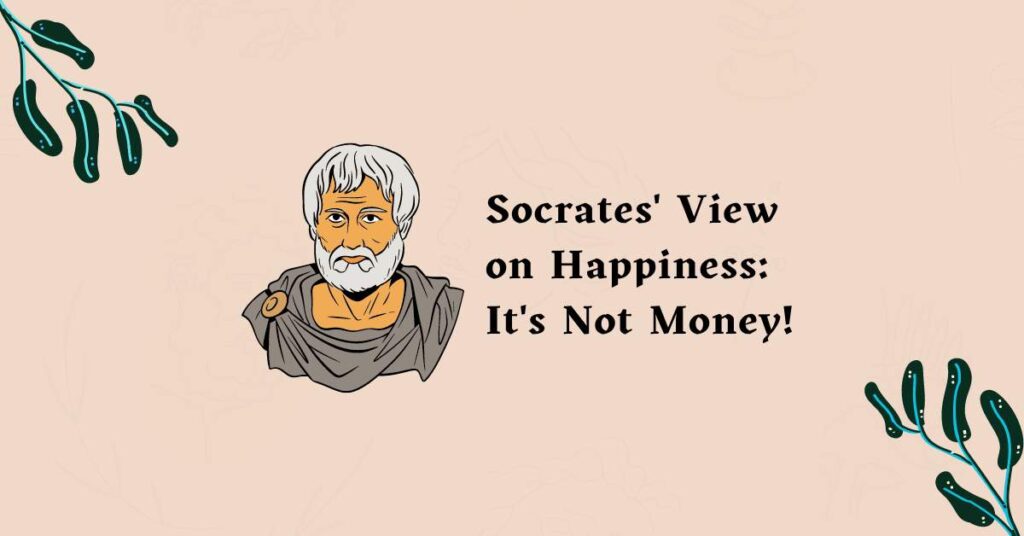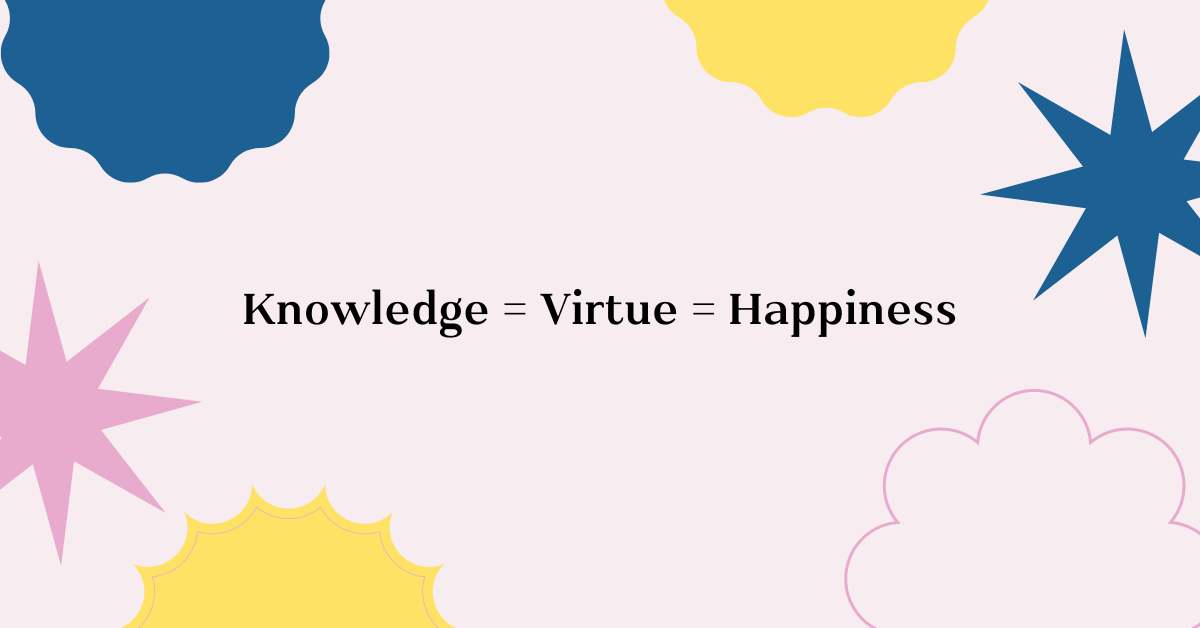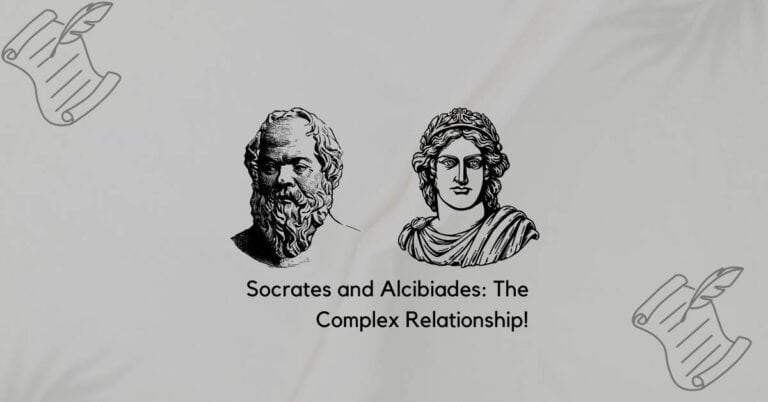Socrates’ View on Happiness: It’s Not Money!
We all chase happiness, but what is it exactly? Is it that amazing vacation you keep dreaming about or the new car everyone seems to be driving?
Socrates, a brilliant thinker from Ancient Greece, had a different perspective on happiness. He wasn’t about telling people what to think but about sparking their curiosity.
Socrates’ view on happiness challenges the way we often think about it. He believed true happiness comes from within, and it’s something we can all cultivate.
In this blog, we will discuss some of the biggest questions about happiness, such as what it is and how to acquire it.
We will also cover Socrates’ ideas about true happiness and how to achieve it. Furthermore, you’ll learn about your challenges while finding true happiness.
What is Happiness? (Socratic Approach)
Desire for Happiness is Universal:
Have you ever noticed how everyone, from your best friend to that grumpy neighbor, seems to be chasing happiness in some way? Socrates believed this desire for happiness is built right into us, a fundamental human drive.
Questioning Conventional Views:
But hold on! Socrates wasn’t buying into the idea that happiness comes from fancy cars or exotic vacations (although a cool trip to Greece might have been nice in his day!). He challenged the common belief that happiness is tied to external things.
Knowing Yourself is Key:
Socrates thought the real key to happiness was figuring out who you truly are and what makes you tick. Think of it like this: if you don’t know yourself, how can you possibly know what will bring you lasting joy?
Virtue: The Cornerstone of Happiness
1. Virtue as a Foundation:
Socrates believed that living a virtuous life, acting with justice, courage, and a moral compass, was the bedrock of true happiness.
Imagine the deep sense of fulfillment you experience after helping someone or standing up for what’s right. That feeling of living with integrity and purpose, according to Socrates, is a significant contributor to lasting happiness.
2. Knowledge and Virtue are linked:
Socrates viewed Virtue as a specific kind of knowledge. The more you understand what’s right and good, the easier it becomes to act virtuously in your everyday life.
Think of it like learning a new language – the more you grasp the grammar and vocabulary, the better you can express yourself clearly.
Similarly, understanding ethical principles allows you to navigate life’s choices with moral clarity.
3. The Harmony of the Soul:
Living virtuously, according to Socrates, creates a state of inner harmony and peace. Imagine a tranquil lake with a clear reflection of the sky.
That’s the kind of inner peace Socrates believed results from living a good life. This internal harmony, he argued, was the true wellspring of happiness, far more fulfilling than any external pleasure or fleeting possession.
Socrates’ Dialogues: Conversations on Finding Joy
Socrates wasn’t just a thinker. He was a master questioner who explored his ideas on happiness through lively dialogues. In this section we’ll dive into three of his most famous works to gain a richer understanding of his views on happiness:
1. The Euthydemus: Happiness Beyond External Goods
Euthydemus, a groundbreaking dialogue featuring Socrates written by his student Plato, tackles the concept of happiness head-on. In this dialogue, Socrates challenges the idea that happiness comes solely from external things like wealth or pleasure. He argues that true happiness lies in living virtuously (acting with justice, courage, and moral compass) and using knowledge wisely.
Imagine a wise person who uses money to improve their life and help others. Compare that to someone who squanders their wealth on fleeting pleasures. According to Socrates, the wise person is on the path to true happiness.
2. The Symposium: Love’s Many Paths to Happiness
The Symposium, written by Plato, is a philosophical dialogue that centers around a dinner party where the topic of love (Eros) takes center stage. Each guest delivers a speech honoring love, offering a different perspective on its nature and significance. Socrates, of course, plays a key role in the discussion, ultimately presenting his unique view on love’s connection to happiness.
Socrates suggests that true happiness isn’t simply about physical attraction or fleeting desires. Instead, he proposes a pursuit of a higher form of love, one that seeks beauty and knowledge beyond the physical.
Think of it like this: a handsome person who uses their looks to manipulate others might gain temporary pleasure but not lasting happiness. However, someone who uses their intelligence to learn and grow can experience a deeper sense of fulfillment.
3. The Republic: Justice and the Harmony Within
In this ambitious dialogue, Socrates delves into the concept of a just society and its connection to individual happiness. He argues that a society that promotes justice and Virtue creates a happier environment for everyone, especially those who live virtuously themselves.
Imagine a peaceful and just society where people act with integrity. According to Socrates, such a society fosters inner peace and tranquillity in its citizens, which contributes significantly to their happiness. This internal harmony, he argues, is far more valuable than any fleeting pleasure or external possession.
The Takeaway: Knowledge is Key to Happiness
By examining these dialogues, we gain a richer understanding of Socrates’ multifaceted view of happiness. A core theme emerges: true happiness isn’t about external factors or fleeting pleasures. Instead, Socrates’ view on happiness emphasizes living virtuously, using knowledge wisely, and cultivating inner peace.
These ideas, explored over 2400 years ago, remain relevant today. By reflecting on Socrates’ wisdom, we can each embark on our journey toward a more fulfilling and joyful life.
Challenges and Obstacles on the Path to Happiness
Socrates may have offered a roadmap to happiness, but the journey isn’t always smooth sailing. Here are some obstacles we might encounter:
False Desires and Ignorance:
Imagine scrolling through social media, bombarded with images of fancy cars and exotic vacations. It’s easy to fall into the trap of mistaking fleeting pleasures for true happiness, as Socrates warned.
These external things might bring a temporary thrill, but Socrates argued they don’t create lasting fulfillment. Think of it like eating a delicious piece of cake: the enjoyment is fleeting, and soon you’ll be craving something else.
The Influence of Society:
Society often bombards us with messages about what success and happiness look like. The pressure to have the latest gadgets, the biggest house, or the most Instagram-worthy lifestyle can be overwhelming.
Socrates would argue that pursuing these external markers of happiness based on societal expectations can lead us astray. True happiness, he believed, comes from within, not from keeping up with the Joneses.
The Ongoing Pursuit:
Understanding yourself and what truly makes you happy isn’t a one-time event. Socrates believed this journey of self-discovery is a lifelong process. There will be bumps in the road, moments of doubt, and times when you have to re-evaluate your priorities.
But the key is to keep asking questions, reflecting on your values, and striving to live a virtuous life. Just like learning a new skill, the pursuit of self-knowledge and living virtuously takes practice and dedication.
Remember: Socrates wasn’t promising a quick fix for happiness. He offered a path towards a more fulfilling life, one built on self-awareness, wisdom, and living with integrity. It’s a challenging but ultimately rewarding journey.
The Enduring Power of Socrates’ Happiness
1. Timeless Wisdom for Modern Lives
Socrates’ ideas on happiness may have originated in Ancient Greece, but their core message resonates powerfully even today.
In our fast-paced, consumer-driven world, his emphasis on inner peace and living virtuously offers a welcome antidote to the pursuit of fleeting pleasures.
2. Relevance in the Modern Age
Here’s why Socrates’ view on happiness remains surprisingly relevant:
Beyond Materialism:
Our world bombards us with messages that equate happiness with material possessions. Socrates challenges this notion, reminding us that true happiness lies within, not in external things.
Societal Pressures:
Social media and advertising create unrealistic expectations of what happiness looks like. Socrates encourages us to question these external influences and focus on what truly matters to us.
The Importance of Self-Knowledge:
In our busy lives, self-reflection can easily fall by the wayside. Socrates’ emphasis on self-discovery and understanding our values is crucial for navigating the complexities of modern life.
3. The Power of Socratic Questioning
Socrates wasn’t just a philosopher; he was a master questioner. His method, known as the Socratic Method, involves asking probing questions to challenge assumptions and encourage critical thinking.
Here’s how Socratic questioning can guide us towards happiness today:
Examining Our Desires:
By asking ourselves why we desire certain things, we can distinguish between fleeting pleasures and what truly brings us fulfillment.
Living with Integrity:
Reflecting on our actions and motivations helps us live a more virtuous life, which according to Socrates, is a cornerstone of happiness.
Lifelong Learning:
The pursuit of knowledge and understanding is a continuous journey. Socrates’ method encourages us to remain curious and open to learning throughout our lives.
4. The Takeaway: A Path to Happiness
Socrates’ view on happiness isn’t a destination, but a lifelong journey. By embracing self-reflection, living with integrity, and continuously seeking knowledge, we can navigate the challenges of the modern world and cultivate a deeper sense of happiness and fulfillment.
4 Quotes of Socrates on Happiness:
In Plato’s “Apology,” we learn about the important lessons and quotes given by Socrates. Here are some of them and their meanings:
“He who is not contented with what he has, would not be contented with what he would like to have.”
This quote tells us that if we’re always wanting more and not appreciating what we already have, we’ll never be happy.
“The secret of happiness, you see, is not found in seeking more, but in developing the capacity to enjoy less.”
Socrates is saying that happiness isn’t about having lots of stuff. It’s about being happy with what we have and enjoying the simple things in life.
“Happiness depends upon ourselves.”
Socrates believed that our happiness is up to us. It’s not about what we have, but how we feel inside and the choices we make.
“He is richest who is content with the least, for content is the wealth of nature.”
Socrates valued contentment over material wealth. Finding joy in simple things and being grateful for what we have can lead to true richness and happiness.
Socrates’ ideas give us a lot to think about when it comes to happiness. By listening to his words, we can learn how to find joy in the little things, be kind to others, and live with integrity.
If you are curious to learn more about Socrates and his philosophy about life or want to know his thoughts on religion, God, and death, you can read our blogs on them.
Conclusion:
In conclusion, Socrates’ view on happiness offers a refreshing perspective that cuts through the noise of our modern world. By prioritizing self-knowledge, inner peace, and living virtuously, we can cultivate a deeper sense of happiness that transcends fleeting pleasures and external pressures.
So, the next time you find yourself chasing the latest trends or feeling envious of someone else’s seemingly perfect life, remember Socrates’ wisdom: true happiness lies within, waiting to be discovered.
Frequently Asked Questions:
Q: What did Socrates say about happiness?
A: Socrates said true happiness comes from living virtuously and using knowledge wisely, not just chasing fleeting pleasures.
Q: How is Plato’s view on happiness similar to Socrates’?
A: Plato agreed with Socrates that virtue and knowledge are key to happiness, but added the idea of striving towards perfect forms for ultimate fulfillment.
Q: What is eudaimonia?
A: Eudaimonia, often translated as “happiness” or “flourishing,” describes a deeper well-being from living a meaningful and virtuous life.
Q: How is eudaimonia different from happiness?
A: Happiness is a general feeling of good, while eudaimonia is a more enduring well-being from living a virtuous and fulfilling life.




